Commercial Solar Installers Enfield
Find top Solar Panels For Businesses in Enfield
Get 3 FREE Commercial Solar Installer quotes for your project today! Compare profiles, reviews, accreditations, portfolio, etc... and choose the best deal.
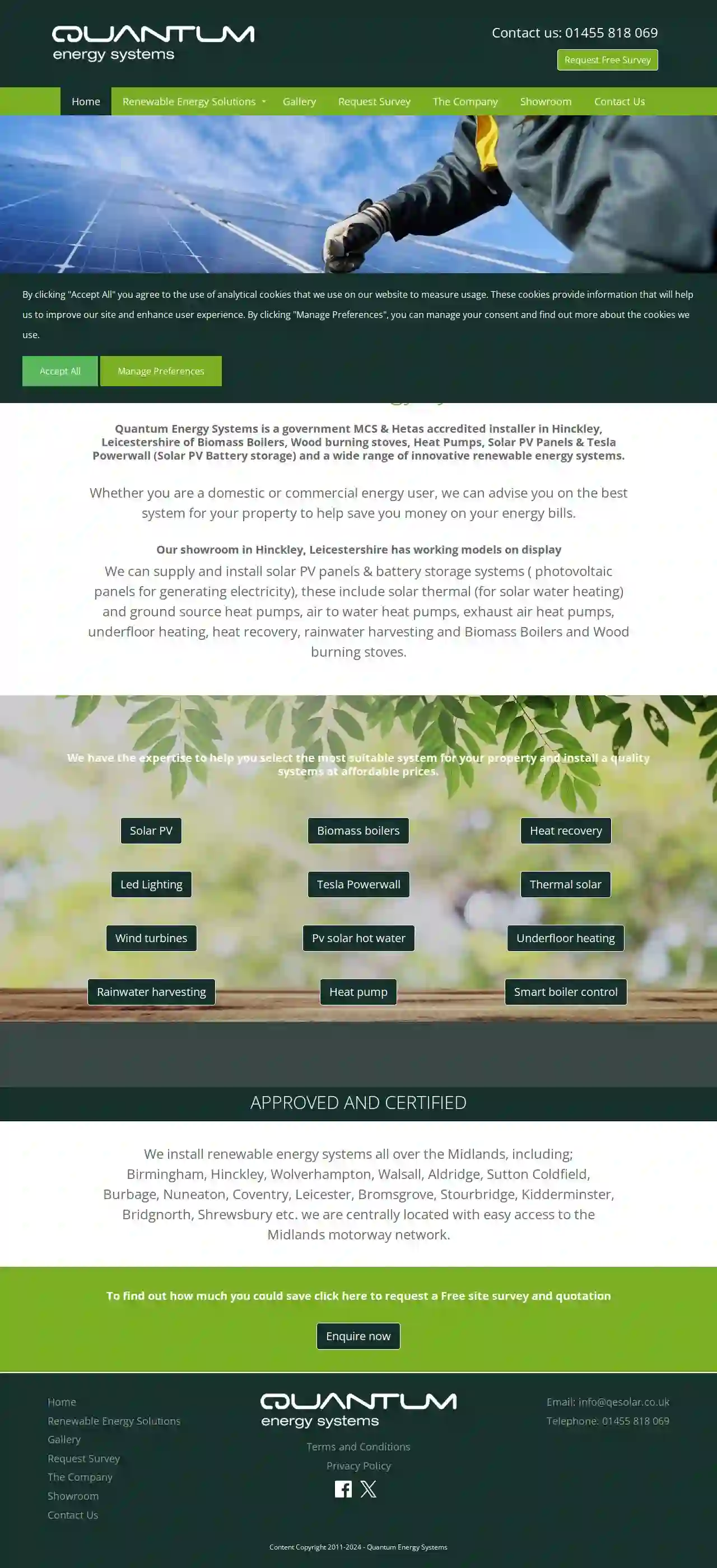
Quantum Energy Systems
Wheatfield Way, Unit 1 Greenfield’s Business Park, Hinckley, LE10 1BB, GBQuantum Energy Systems is a government MCS & Hetas accredited installer based in Hinckley, Leicestershire. We specialize in a wide range of renewable energy systems, including Biomass Boilers, Wood burning stoves, Heat Pumps, Solar PV Panels & Tesla Powerwall (Solar PV Battery storage). Whether you're a domestic or commercial energy user, we can help you find the best system for your property to save money on your energy bills. Our showroom in Hinckley, Leicestershire, features working models on display, allowing you to see our products in action. We supply and install a variety of renewable energy solutions, including solar PV panels and battery storage systems (photovoltaic panels for generating electricity), solar thermal (for solar water heating), ground source heat pumps, air to water heat pumps, exhaust air heat pumps, underfloor heating, heat recovery, rainwater harvesting, and Biomass Boilers and Wood burning stoves. Our team of experts can help you select the most suitable system for your needs and install it at an affordable price. We serve the Midlands region, including Birmingham, Hinckley, Wolverhampton, Walsall, Aldridge, Sutton Coldfield, Burbage, Nuneaton, Coventry, Leicester, Bromsgrove, Stourbridge, Kidderminster, Bridgnorth, and Shrewsbury. Our central location provides easy access to the Midlands motorway network. To discover how much you could save, request a free site survey and quotation today.
- Services
- Why Us?
- Accreditations
- Gallery
Get Quote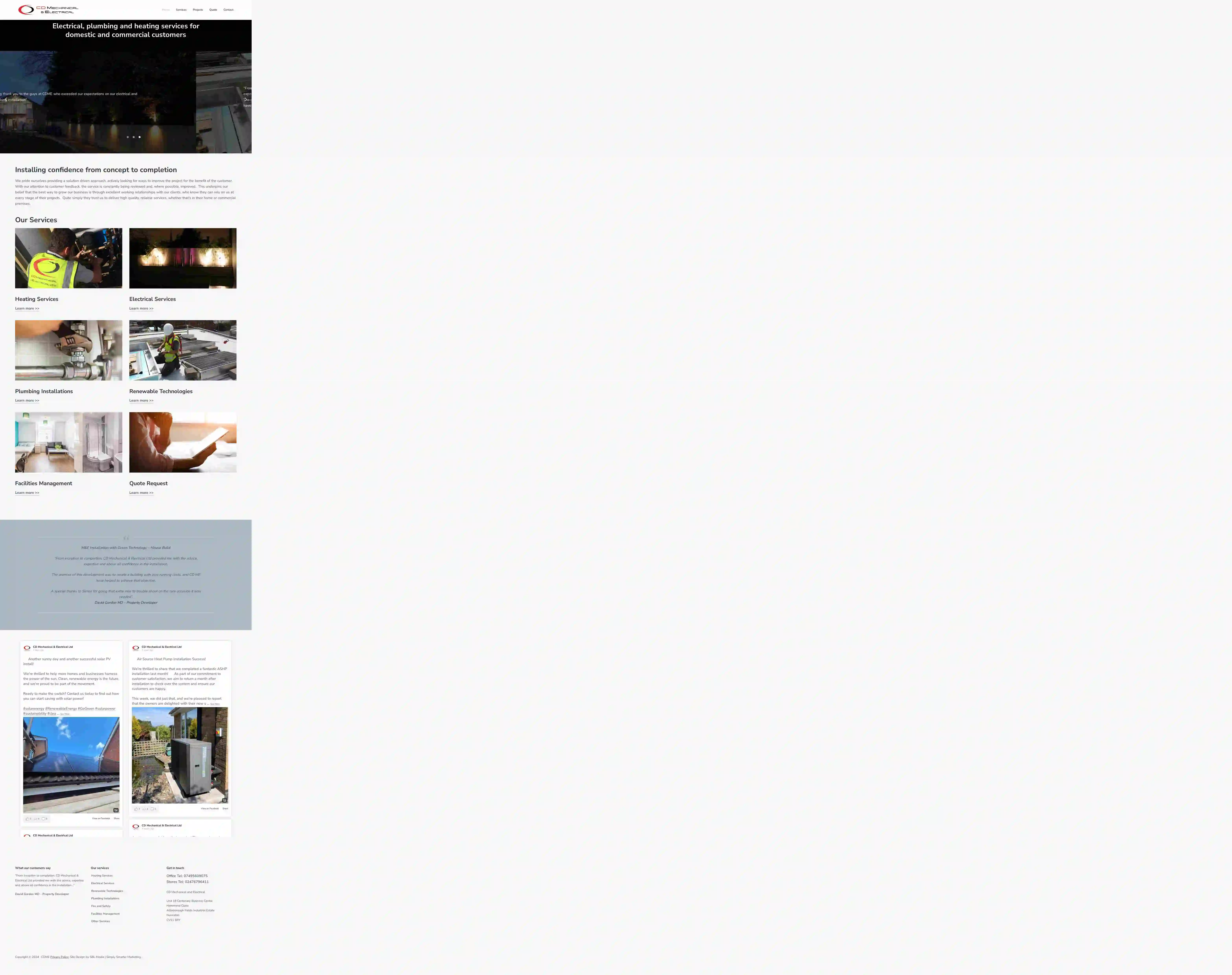
Complete Green Solutions
11 reviewsHammond Close, Attleborough Fields Industrial Estate, Unit 19 Centenary Business Centre, Nuneaton, CV11 6RY, GBCD Mechanical and Electrical Ltd is a company that delivers Mechanical and Electrical services to domestic and commercial businesses for over 20 years. We pride ourselves on providing a solution-driven approach, actively looking for ways to improve the project for the benefit of the customer. With our attention to customer feedback, the service is constantly being reviewed and, where possible, improved. This underpins our belief that the best way to grow our business is through excellent working relationships with our clients, who know they can rely on us at every stage of their projects. Quite simply, they trust us to deliver high-quality, reliable services, whether that's in their home or commercial premises.
- Services
- Why Us?
- Testimonials
- Gallery
Get Quote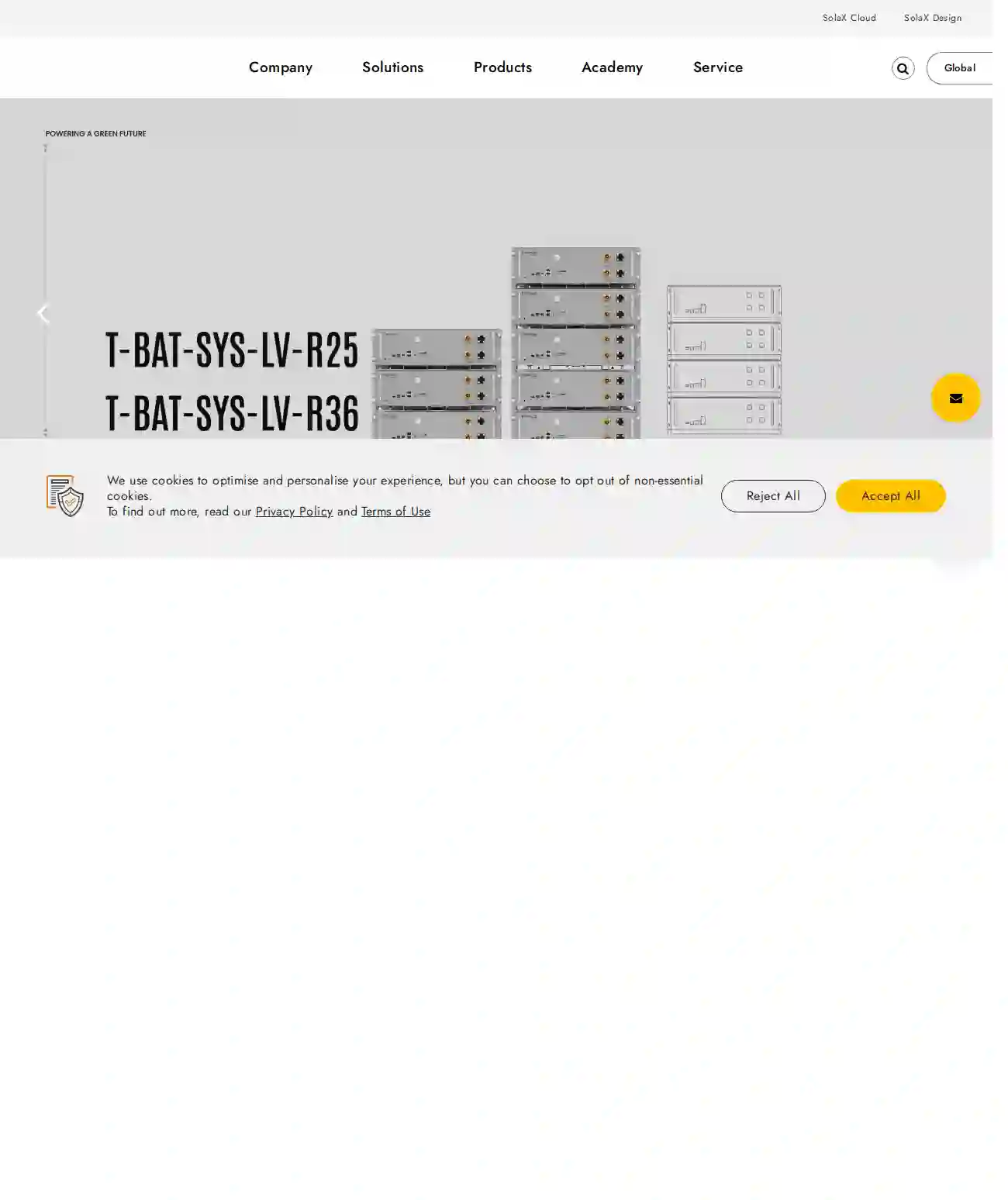
SolaX Power
3.611 reviews21 Nicholas Dr, Dandenong South, 3175, GBSolaX Power is a leading provider of energy storage solutions, offering reliable and efficient systems for residential and commercial use. With a global presence and a team of experts, SolaX Power is committed to helping customers achieve their energy goals.
- Services
- Why Us?
- Gallery
Get Quote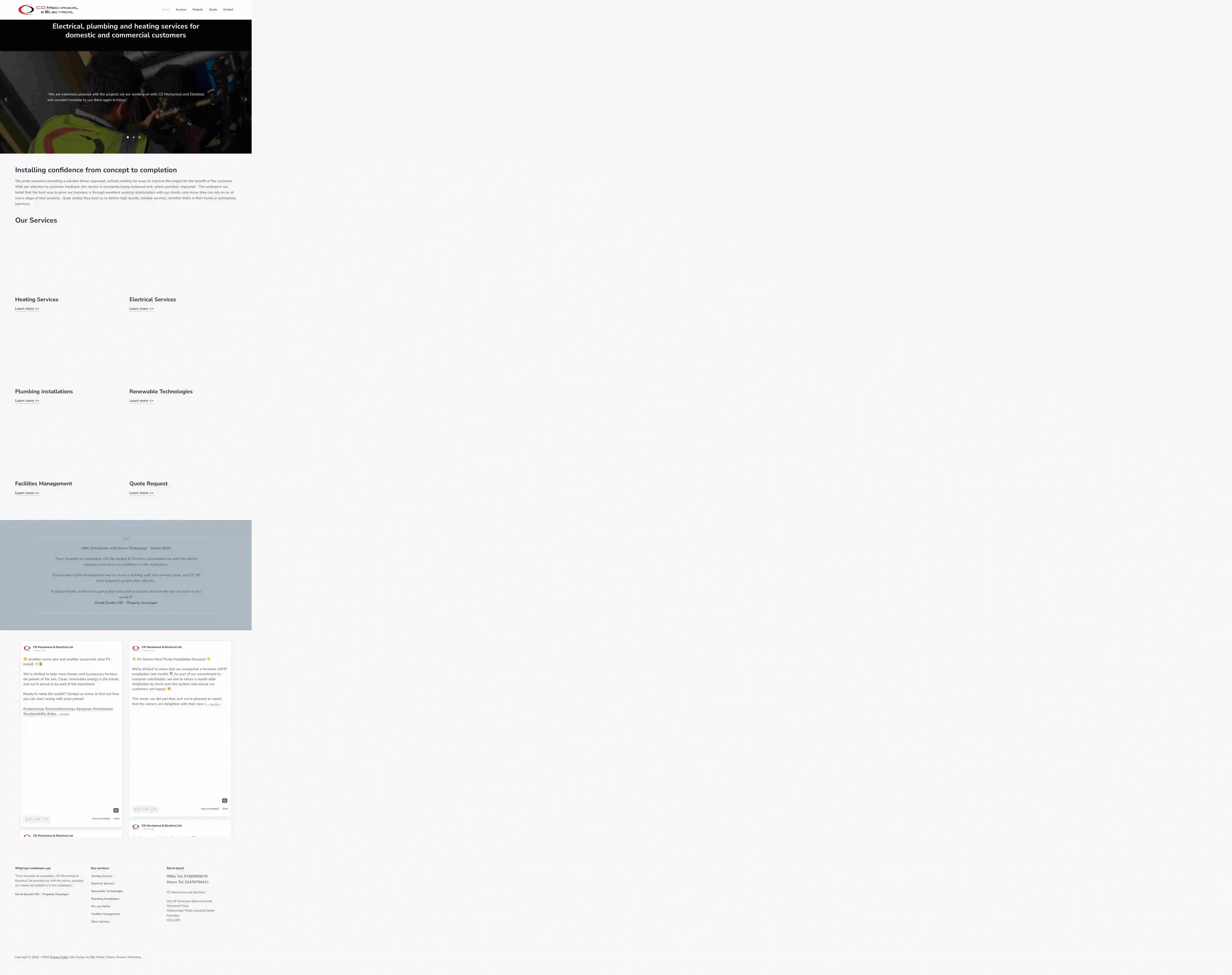
CD Mechanical & Electrical (Midlands) Ltd
55 reviewsHammond Close, Attleborough Fields Industrial Estate, Unit 19 Centenary Business Centre, Nuneaton, CV11 6RY, GBCD Mechanical and Electrical Ltd delivering Mechanical and Electrical services to domestic and commercial businesses for over 20 years. We pride ourselves providing a solution driven approach, actively looking for ways to improve the project for the benefit of the customer. With our attention to customer feedback, the service is constantly being reviewed and, where possible, improved. This underpins our belief that the best way to grow our business is through excellent working relationships with our clients, who know they can rely on us at every stage of their projects. Quite simply they trust us to deliver high quality, reliable services, whether that’s in their home or commercial premises.
- Services
- Why Us?
- Accreditations
- Testimonials
- Gallery
Get Quote
Ienergyservices
271 Forest Road, Woodhouse, LE12 8TZ, GBi energy services are suppliers of renewable technologies, providing clean, sustainable energy solutions for homes and businesses. Established in 2008, they have a proven track record of installing and consulting on renewable energy systems ranging from 2KW to 3MW. i energy services prides itself on offering high-quality products backed by performance guarantees from leading global renewable technology providers. They provide full project finance options and strive for constant communication with customers throughout the project lifecycle. i energy services is committed to helping customers transition to green technologies and offers a satisfaction guarantee on all installations.
- Services
- Why Us?
- Gallery
Get Quote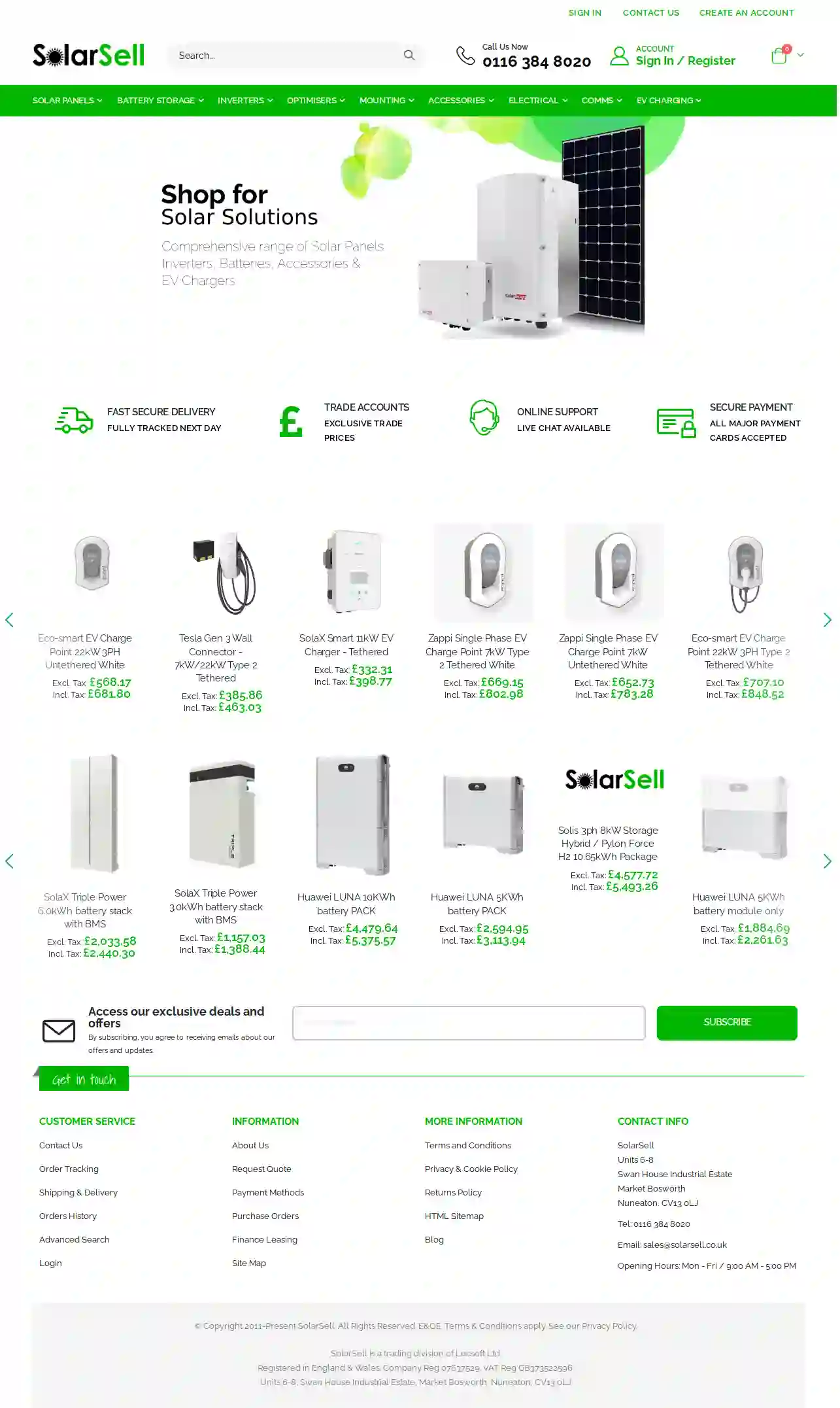
SolarSell
Units 6-8, Swan House Industrial Estate, Market Bosworth, CV13 0LJ, GBSolarSell is a leading independent UK wholesale supplier of solar panels, inverters and battery storage for brands such as SolarEdge, Enphase, JA Solar & Growatt to name just a few. Being an independent wholesaler we bulk purchase to get access to great discounted prices which we pass onto our customers. We have thousands of products available on our website to order for next day delivery, with additional products available to order through our supplier network. All of our new stock is brand new retail factory sealed with full manufacturer’s warranty, manufacturers extended warranty services are also available to purchase too if required. We try to go the extra mile - and always will. Customer focus is at the core of our business, we like to treat our clients with honesty, efficiency and with an eye on always driving value. Should you have any questions please feel free to call / email our friendly members of staff who will be more than happy to help!
- Services
- Why Us?
- Gallery
Get Quote
Sunergy Renewables Limited
Enfield, GBRenewable Energy Experts Helping You Save Money With Renewable Solutions Here at Sunergy Renewables, we are renewable technology specialists, providing sustainable low carbon energy alternatives for homes and businesses nationwide. Contact Us Today Solar Battery Storage SystemsWhy waste FREE energy? Store your surplus solar power in a battery for use in the home! Smart EV ChargingUse surplus solar power to charge your car! Smart ChargersSolar PV InstallationBenefit from free electricity produced by the sun with a solar pv systemSolar PV Battery storage for home & business Battery storage experts for home & business 11.6kWh residential case study we filmed in Falmouth, this property is now running on solar energy around the clock. Expert installersOur installers are experienced energy storage technicians Nationwide serviceWe cover most areas across England and Wales Highly reviewedCheck out our 5 star TrustPilot reviews After sale supportWe are here for you after the system has been installed We only work with trusted brands Our ServicesWhat Sunergy Renewables Can Help You WithThese are the core services we offer but are not limited to, if there is something you need but cant see it here, give us a call! Battery Storage Renewable Heating Solar Inverter Replacement EV Car Charging Power your home or business with battery storage Battery storage is the future of energy, keep your home or business powered with batteries charged full of surplus solar power or from energy bought directly from the grid at a much lower price. Our battery solutions can work with any existing solar pv system on the market today, they are all expandable and have the ability to keep important devices running in the event of a powercut. Learn more Heat your hot water from surplus solar power with a hot water diverter The Eddi is a new and reliable power diverter that works by using any excess energy your solar pv generates and redirecting it to heat your water tank. By providing your household with hot water and heating its puts otherwise wasted energy to use and helps to make every day that little bit easier. Eddi is compatible with the Tesla Powerwall 2, which makes the power diverter a no brainer for smart homeowners. Eddi also has the added benefit of being tailored so that it observes your systems surplus power and adjusts the voltage accordingly so that it matches the heater load. companies. Has your old solar inverter failed? We can replace it with a new one complete with a fresh 10 year warranty A solar panel inverter converts the direct current (DC) electricity produced by your solar panels into alternating current (AC) electricity, which can then be used to power your home or business.
- Services
- Why Us?
- Gallery
Get Quote- Th
The Eco Supermarket
Enfield, GB- Services
- Why Us?
Get Quote - Gr
Green Planet Solar Energy Ltd
Enfield, GB- Services
- Why Us?
Get Quote - Su
Sun2solar Ltd
Enfield, GB- Services
- Why Us?
Get Quote
Over 3,485+ Solar Installers onboarded
Our solar companies operate in Enfield & beyond!
SolarCompaniesHub has curated and vetted the Best Solar Installers in Enfield. Find the most reliable contractor today.
Frequently Asked Questions About Commercial Solar Installations
- Efficiency: Higher-efficiency panels produce more energy from the same amount of sunlight, but they may have a higher upfront cost.
- Space Availability: If you have limited roof or ground space, higher-efficiency panels allow you to maximize energy production.
- Aesthetics: Consider the visual appearance of the panels and how they integrate with your building or surroundings. Monocrystalline panels tend to have a more sleek and modern look, while polycrystalline panels have a more traditional blue appearance.
- Cost: Polycrystalline panels are generally more budget-friendly, while monocrystalline panels tend to be more expensive.
- Durability and Warranty: All types of solar panels are designed to be durable, but some manufacturers offer longer warranties or better performance guarantees.
- System Size (kW): Larger systems generally cost more.
- Type of Solar Panels: Higher-efficiency panels can have a higher upfront cost but may generate more energy over time.
- Roof Complexity: Complex roofs (e.g., multiple angles, obstructions) may require more labor and specialized mounting hardware, increasing costs.
- Labor Costs: Labor rates vary by location.
- Permitting and Interconnection Fees: Costs for permits, inspections, and connecting to the grid can vary.
- Available Incentives: Tax credits, rebates, and other incentives can significantly reduce the overall cost.
- Location: Areas with high dust, pollution, or bird activity may require more frequent cleaning.
- Panel Angle: Flat or low-sloped panels tend to accumulate more dirt than steeper panels.
- Rainfall: Areas with regular rainfall may need less cleaning, as rain can help wash away some debris.
How do I choose the right solar panel type for my business?
How much does a commercial solar system cost?
Do commercial solar panels require regular cleaning?
Can I add battery storage to my commercial solar system later?
How do I choose the right solar panel type for my business?
- Efficiency: Higher-efficiency panels produce more energy from the same amount of sunlight, but they may have a higher upfront cost.
- Space Availability: If you have limited roof or ground space, higher-efficiency panels allow you to maximize energy production.
- Aesthetics: Consider the visual appearance of the panels and how they integrate with your building or surroundings. Monocrystalline panels tend to have a more sleek and modern look, while polycrystalline panels have a more traditional blue appearance.
- Cost: Polycrystalline panels are generally more budget-friendly, while monocrystalline panels tend to be more expensive.
- Durability and Warranty: All types of solar panels are designed to be durable, but some manufacturers offer longer warranties or better performance guarantees.
How much does a commercial solar system cost?
- System Size (kW): Larger systems generally cost more.
- Type of Solar Panels: Higher-efficiency panels can have a higher upfront cost but may generate more energy over time.
- Roof Complexity: Complex roofs (e.g., multiple angles, obstructions) may require more labor and specialized mounting hardware, increasing costs.
- Labor Costs: Labor rates vary by location.
- Permitting and Interconnection Fees: Costs for permits, inspections, and connecting to the grid can vary.
- Available Incentives: Tax credits, rebates, and other incentives can significantly reduce the overall cost.
Do commercial solar panels require regular cleaning?
- Location: Areas with high dust, pollution, or bird activity may require more frequent cleaning.
- Panel Angle: Flat or low-sloped panels tend to accumulate more dirt than steeper panels.
- Rainfall: Areas with regular rainfall may need less cleaning, as rain can help wash away some debris.